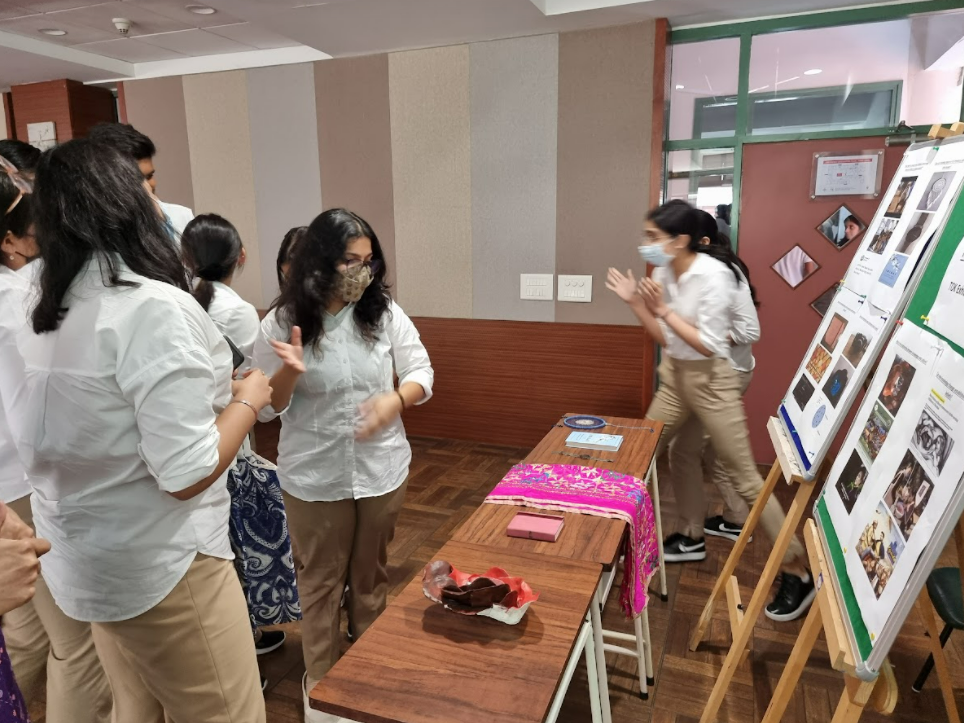Theory Of Knowledge Exhibition 2022- Pursuit of Knowledge
July 26, 2022
Theory of Knowledge, or TOK, is an integral part of the IB Diploma Program. It provides an opportunity for students to reflect on the nature of knowledge, and on how we know what we claim to know. It aims to make students aware of the interpretative nature of knowledge, including personal ideological biases. The TOK exhibition, an assessment component of the subject, is about exploring how TOK is evident in the world around us. Students are required to select one prompt from the list of 35 provided in the TOK subject guide and conduct an exhibition of 3 objects connected to their chosen prompt. The exhibition gives students an opportunity to choose objects from a huge variety and are encouraged to select objects that they can link to areas of personal interest.
The TOK Exhibition was carried out by IBDP Y2 students on 15 July 2022, with different themes and prompts. Each student picked an IA prompt and exploreddifferent approaches while answering it. The students shared their knowledge with clear justification through the objects of their choice. The chosen objects were taken from their real-life experience such as from CAS, Visual Art, English and science classes, or gifted to them by their family members and friends, tweets, books and Netflix series. The different topics and possibilities to explore prompts in varying ways, has encouraged students for the future.
Students engaged in their research and found clear links between simple and complicated issues, the past and the future. Our student, Mrinalini reflected on knowledge and culture, and more specifically on whether knowledge and culture have any relationship between them and if so, then what type of relationship it is. According to her, knowledge is anything that can be experienced or acquired while culture can be a collection of a belief, values, traditions, or even rituals followed by a particular group of people or society altogether. She justified this with her three objects -an artpiece created by her in her Visual Art class, Her Arabic Book and a snapshot from series, Bridgeton.
Similarly,Mannat reflected on whether some knowledge belong only to particular communities of knowers and justified it with three objects from her past experience, such as, her personal diary, an Indian Army black trunk of her great grandfather and her personal phulkari passed down six generations in my family. “I chose this prompt because I was able to relate a lot of information to my personal life experiences”, she said.
Tanmay explored the prompt: How might the context in which knowledge is presented influence whether it is accepted or rejected and justified this with three objects – an image of a Syrian girl taken during the war, an image of women protesting the ruling of India’s highest court, the Supreme Court and a tweet by Foxnews. According to him the context, or background information on a piece of information, is key to its acceptance or rejection by groups of knowers, and truly informed decisions cannot be made without it.
RushilDoger reflected on the prompt; can new knowledge change established values and beliefs? According to him, new knowledge can change the pre-existing values and beliefs that we carry. It can modify the way we think and justify it through a photograph clicked during his CAS experience, an image of an article and a movie poster. Angad, too, justified the same prompt through three objects taken from his past experience – an electron model he studied in his Chemistry class, his personal clock and a camera.
Lastly, Akshat explored the prompt: Does our knowledge depend on the interactions with other knowers? He explained this through a dream catcher gifted to him by his aunt, his grandfather’s watch and a book gifted to him by his brother. “I believe that most of the basic things in our lives that we currently utilise are taught to us through these interactions and are extremely important for us. These not only help us gain more knowledge about the surroundings but also help us build a deeper understanding”, Akshat asserted.
Overall, the exhibition was an enriching experience where the students shared their perspectives on the IA prompts with their juniors from IB Year 1 and Grade 10.











